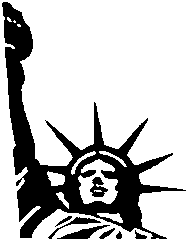The verses were sent anonymously to a British magazine and published under
the title « In Flanders' Fields ».
In January of 1918, Colonel McCrae perhaps sensing his own impending death
quoted the last lines from his own poem to the doctor in charge of his
case.
Tell them this,
If ye break faith with us who die,
We shall not sleep, though poppies
grow
In Flanders fields.
The first Poppy Day
It was, however, an American lady, a Miss Moina Michael, who, impressed
by that last verse wrote a poem called «The Victory
Emblem ». On November 9th 1918, just two days before
the Armistice was signed, she was attending a conference of War Secretaries
of the YMCA held at her house. She was presented with a small gift of money
which she decided to use to buy and sell 25 poppies. The French Secretary,
Madame Guérin, had the idea that artificial poppies should be made
and sold throughout the world to help ex-servicemen and their dependants
in need. The first Poppy Day was held in Britain on November 11th 1921
and a factory, employing five disabled ex-servicemen, started making them
there in 1922. The Royal British Legion, like its Canadian counterpart
has been distributing them ever since.
If you are bored enough to watch the Parliamentary channel on TV you will
notice that the members from the rest of Canada seem proud to wear their
poppies at this time of the year. You will notice no doubt that the members
of the main Quebec party do not, in general, do so. Exactly like most of
their provincial counterparts in fact.
If one reads the history of Quebec, especially prior to the second World
War, a possible explanation emerges for the seeming reluctance of this
province's politicians to display this emblem. Many of the politicians
and self described elite of that time were actually supportive of the fascist
philosophy espoused by Benito Mussolini in Italy, Adolf Hitler in Nazi
Germany and Francisco Franco in Spain. As a result, many of them viewed
the war being conducted against Nazi Germany as not being a righteous war,
and participation in it was considered to be service on behalf of a Jewish
conspiracy.
|
« We
talk and write often about liberty and the many attacks being made upon
it. Those whom we honour by wearing the poppy took practical steps to defend
it. »
|

|
In 1944, the Bloc populaire candidate in the Cartier riding was
asking questions such as; «What right do these people
(Jews) have to ask us to get killed, to ruin our country, because they
have suffered? » Many more prominent Quebec figures,
among them Henri Bourassa, André Laurendeau, Abbé Groulx,
Jean Drapeau, Pierre Trudeau, Gérard Pelletier and Camille Laurin
were supporters of the Bloc populaire which opposed conscription
into the Canadian armed forces. It is very interesting to read their various
explanations after the war and the elegant fictions they have since devised
to explain away their former views.
This breach of good taste on the part of our politicians, particularly
those of the separatist persuasion, dishonours the memory of those thousands
of brave French and English Canadians from Quebec (who would be Québécois
today) and other parts of Canada, who fought and died in two world
wars so that many of these same politicians could continue to cling tenaciously
to their bizarre and discredited views.
True and fictitious heroes
One might think that a movement which seeks to unite its «
pure laine » citizenry would at least seek
to honour the memory of those patriotic « pure laine
» heroes who gave their lives for freedom and their «
pays » about which they pontificate so often. Most movements
have their heroes, but this movement seems to consider those who sacrificed
themselves for liberty as simply so many sheeps. They prefer leaders or
heroes like Dollard Des Ormeaux whose largely fictitious deeds the Abbé
Groulx celebrated, and whose memory is now perpetuated each May 24th. Perhaps
the advantage of a partially fictitious hero is that you can change the
legend to suit the occasion. Throughout the history of Quebec there are
references to the search for a leader. We find examples of it from Jean
Bruchési's plea for « un chef »
in 1926, in André Laurendeau's editorial intercession in 1935 through
Maurice Duplessis to today's acclamation, by some, of Lucien Bouchard as
the potential « saviour » of Quebec.
Immediately after the second world war one can find many of those same
prominent names, still members of Quebec's intellectual establishment,
cropping up writing letters in defence of the various « immigrants
» from Vichy France who were being threatened with deportation.
Individuals whose wartime activities as Nazi collaborators and Vichy officials
meant that they were not welcome in De Gaulle's France. In fact, many were
subsequently sentenced in absentia. Their Quebec supporters who
gave them money, food and shelter exercised their political influence in
their favour sometimes successfully, sometimes not. In all fairness, it
should be pointed out that these escaped criminals must also have had considerable
assistance from people in the Federal government.
The fact that many of these same people have been largely responsible for
creating and manipulating public opinion since those times, perhaps explains
why the Quebec population, by and large, no longer bothers to remember
the ultimate sacrifices for freedom made on their behalf. We talk and write
often about liberty and the many attacks being made upon it. Those whom
we honour by wearing the poppy took practical steps to defend it; we should
not break faith with them.
Articles précédents
de Ralph Maddocks |